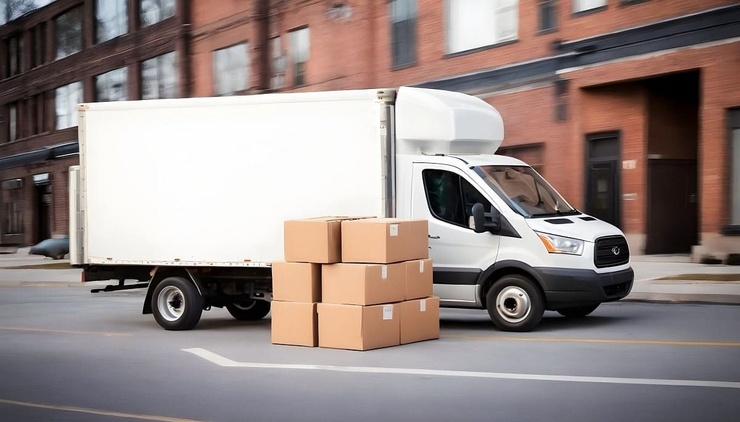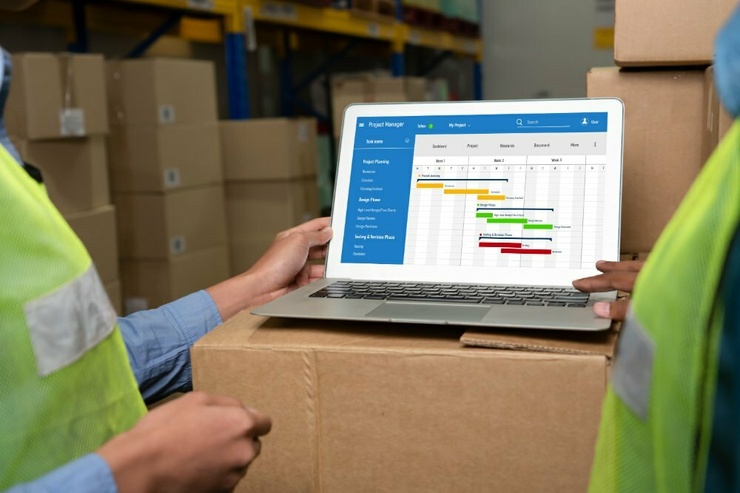- Logistics Complexity
Top 8 Logistics Innovations and Trends Shaping 2025
As the logistics industry evolves, it is entering a transformative era driven by cutting-edge technologies and shifting consumer demands. Innovations such as artificial intelligence (AI), the Internet of Things (IoT), and blockchain are not only enhancing operational efficiencies but also reshaping the entire supply chain landscape. For instance, AI-powered algorithms can optimize delivery routes in real-time, reducing fuel costs and improving delivery times. Similarly, IoT sensors can monitor the condition of perishable goods during transit, ensuring they arrive fresh and safe. Businesses are increasingly focusing on logistics trends such as automation, real-time tracking, and sustainability, aiming to create agile, responsive systems that can adapt to market fluctuations and consumer expectations. This convergence of technology and logistics is set to redefine how goods are transported, tracked, and delivered, paving the way for a smarter, more resilient future in logistics management.
8 Top Logistics Innovations and Trends Shaping 2025
The logistics industry is undergoing a significant transformation as it adapts to emerging logistics innovations and evolving consumer expectations. Several key innovations and logistics trends are set to shape the future of logistics, enhancing efficiency, sustainability, and customer satisfaction. Let's discuss some of the key innovations and trends that the industry is looking forward to:
1.Automation in Logistics
Automation is set to revolutionize logistics by enhancing efficiency and reducing operational costs. Businesses will increasingly adopt technologies such as robotic process automation (RPA) and autonomous vehicles to streamline operations. Logistics automation aims to minimize manual labor, reduce errors, and improve speed in processes like inventory management and order fulfillment. Automated systems will handle repetitive tasks, allowing human workers to focus on more complex activities. The integration of these technologies will not only optimize workflows but also enhance overall productivity, making logistics operations more agile and responsive to market demands.
2. Sustainable Logistics Practices
Sustainability is becoming a core focus in logistics as businesses strive to reduce their carbon footprint and implement eco-friendly practices. Sustainable logistics practices will include the use of electric vehicles, optimized routing to reduce fuel consumption, and adopting green packaging solutions. Businesses will also invest in renewable energy sources for their warehouses and distribution centers. This logistics trend is driven by increasing consumer demand for environmentally responsible practices and regulatory pressures for emissions reductions. Prioritizing sustainability not only helps the environment but also enhances brand reputation and customer loyalty.
3. Artificial Intelligence and Machine Learning Applications
Artificial intelligence and machine learning are transforming logistics by enabling predictive analytics, demand forecasting, and route optimization. These technologies allow businesses to analyze vast amounts of data quickly, leading to more informed decision-making. For instance, AI can predict fluctuations in demand, helping businesses adjust their inventory levels accordingly. Machine learning algorithms can improve operational efficiency by continuously learning from past data to optimize various logistics processes. The integration of AI will enhance customer service through automated chatbots and improve security with advanced risk assessment systems.
4. Rise of Last-Mile Delivery Innovations
The last-mile delivery segment is experiencing significant innovations aimed at improving efficiency and customer satisfaction. Looking ahead, businesses will leverage technologies such as drones and autonomous delivery vehicles to expedite deliveries while reducing costs. Additionally, smart lockers and mobile apps will facilitate contactless delivery options for consumers. As e-commerce continues to grow, optimizing last-mile delivery will be crucial for maintaining competitive advantage. Innovations in this area will focus on speed, reliability, and convenience, ensuring that customers receive their orders promptly and accurately.
5. Blockchain in Supply Chain Management
Blockchain technology is poised to enhance transparency and traceability within supply chains. This decentralized ledger system allows all stakeholders to access real-time data regarding the movement of goods, ensuring authenticity and reducing fraud risks. By implementing blockchain, businesses can streamline processes such as contract management and payment settlements while improving compliance with regulatory standards. The ability to track products from origin to destination enhances trust among consumers and partners alike, making blockchain an essential tool for modern supply chain management.
6. Growth of 3PL Partnerships
The demand for third-party logistics (3PL) partnerships is expected to grow as businesses seek specialized expertise in managing complex supply chains. Businesses will increasingly outsource logistics functions to 3PL providers that offer advanced technology solutions and extensive industry knowledge. This trend allows businesses to focus on their core competencies while benefiting from the scalability and flexibility that 3PLs provide. As supply chains become more globalized and intricate, partnering with experienced logistics providers will be critical for enhancing operational efficiency and responsiveness.
7. IoT for Enhanced Connectivity
The Internet of Things (IoT) is another logistics trend to watch out for. It is set to revolutionize logistics by providing enhanced connectivity between devices, assets, and systems. IoT sensors will enable real-time tracking of shipments, monitoring conditions such as temperature and humidity during transit. This technology facilitates proactive decision-making by alerting stakeholders about potential delays or issues before they escalate. The increased visibility provided by IoT will help businesses optimize their supply chains, improve inventory management, and enhance customer satisfaction through timely updates on order status.
8. Focus on Customer-Centric Logistics
As consumer expectations evolve, businesses are shifting toward a more customer-centric approach in their operations. This logistics trend emphasizes personalized services that cater to individual customer needs, including flexible delivery options and transparent communication regarding order status. Businesses will leverage data analytics to gain insights into customer preferences and behaviors, allowing them to tailor their offerings accordingly. By prioritizing customer experience in logistics strategies, businesses can build stronger relationships with clients and foster loyalty in an increasingly competitive market.
Conclusion
The logistics industry is set for significant changes in 2025, influenced by new technologies and changing consumer needs. Logistics innovations like artificial intelligence, automation, and blockchain are improving efficiency and transforming supply chains. Using sustainable practices and advanced technologies will enhance transparency and responsiveness, while advancements in last-mile delivery will meet the increasing demands of e-commerce. As businesses adopt these logistics trends, they will create more flexible and customer-focused operations that emphasize efficiency and sustainability. This shift is crucial for staying competitive in a rapidly changing market and will lead to a smarter and more resilient logistics future.
Frequently Asked Questions
What are the top logistics innovations in 2025?
In 2025, logistics innovations will include artificial intelligence for predictive analytics and route optimization, blockchain for enhanced transparency, and IoT for real-time tracking of shipments. Automation and robotics will streamline warehouse operations and last-mile deliveries.
How are logistics trends shaping the supply chain industry in 2025?
Logistics trends are reshaping the supply chain by driving efficiency and responsiveness through advanced technologies like AI and IoT. These innovations enable better inventory management and cost reduction. Additionally, a growing focus on sustainability is driving businesses to adopt greener practices to meet regulatory requirements and consumer expectations.
How does AI improve efficiency in logistics operations?
AI enhances logistics efficiency by optimizing demand forecasting, which helps maintain optimal inventory levels and streamline transportation routes. It automates repetitive tasks, reducing human error and increasing speed. AI-driven systems also provide real-time insights for quicker decision-making, improving overall operational efficiency.
Why is sustainability a major focus in logistics trends for 2025?
Sustainability is a major focus due to increasing regulatory pressures and rising consumer demand for environmentally friendly practices. Businesses are adopting sustainable methods to comply with regulations and meet customer expectations while also achieving long-term cost savings through improved efficiency and reduced waste.

Komal Puri is a seasoned professional in the logistics and supply chain industry. As the AVP of Marketing and a subject matter expert at FarEye, she has been instrumental in shaping the industry narrative for the past decade. Her expertise and insights have earned her numerous awards and recognition. Komal’s writings reflect her deep understanding of the industry, offering valuable insights and thought leadership.
Let's Talk to Our Experts and Optimize Your Deliveries Today!
An expert from our team will reach out within 24 hours



